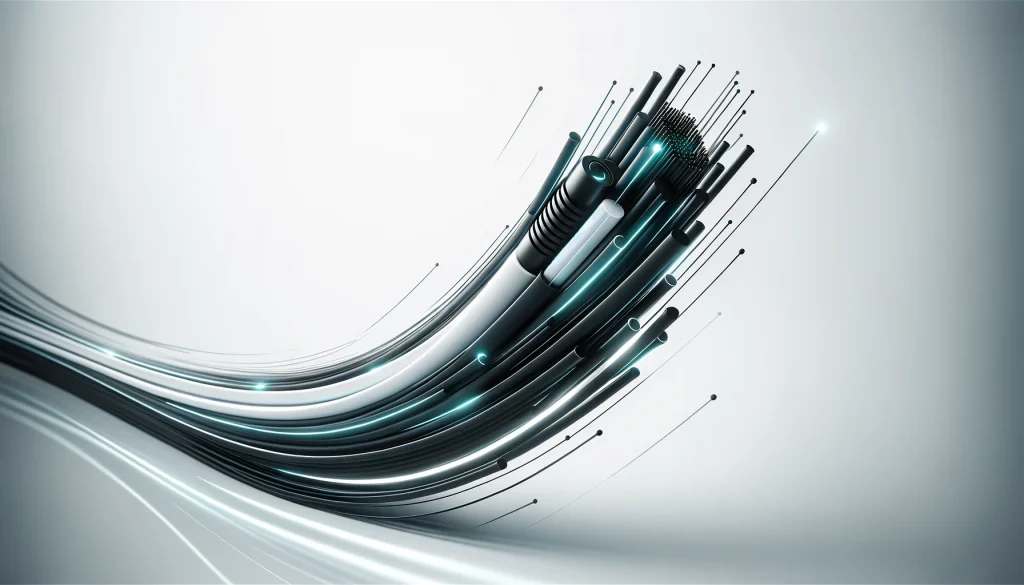
A leased line is a dedicated connection that provides a private, fixed-bandwidth data link exclusively for your business’s use. Unlike shared services such as standard broadband, a leased line does not have traffic contending for bandwidth, ensuring consistent high speeds and reliability.
Leased lines are typically used by businesses for web-based content distribution, cloud-based applications, voice applications and online backups.

Whilst technically a wide range of services are delivered using a leased line model in practise we find that when searching for “leased line” most prospects are typically looking for a point-to-point business internet connection (sometimes referred to as Dedicated Internet Access or DIA).
Here are the typical benefits of a leased line connection:
A leased line circuit is a dedicated fibre connection directly between two points, typically this is between your business premises and your telecom provider’s point of presence (PoP) providing connectivity to the Internet or to one or more cloud service providers.
With most leased line connections customers lease the service capacity provided by the fibre optic infrastructure, as opposed to an individual physical strand of fibre optic cable. This is achieved through a range of different technologies provided by telecoms providers including Wave Division Multiplexing (WDM), Ethernet over Fibre and VPN technology.
Ethernet Access Direct (EAD) is the most common type of Leased Line. Also know as “Full Fibre”, or “Fibre Ethernet” it refers to a leased line connection that uses fibre-optic cables from end to end, ensuring high-speed and reliable internet connectivity.
Ethernet in the First Mile (EFM), also known as “Ethernet Broadband” is a type of leased line that uses multiple copper pairs to deliver Ethernet services, often as an alternative to fibre in areas where fibre may not be available.
Ethernet over FTTC combines fibre to the cabinet with copper to the premises. It is suitable for small to medium-sized businesses, typically available in urban/suburban areas with existing fibre infrastructure.
A managed leased line typically refers to a fully serviced solution that includes:
Some managed service providers also provide a variety of security options including managed IDS/IPS, managed firewall, managed router, and anti-DDOS services.
Here are the main differences between a leased line connection and a DSL connection (ADSL, SDSL etc).
| Feature | Leased Line | DSL |
|---|---|---|
| Connection Type | Dedicated | Shared |
| Speed Symmetry | Symmetric (equal upload and download speeds) | Asymmetric (faster download than upload speeds) |
| Bandwidth | Guaranteed bandwidth without fluctuation | Variable, can decrease during peak times |
| Reliability and SLA | High reliability with SLA guarantees | Generally reliable, but with fewer guarantees |
| Cost | Higher due to dedicated service and infrastructure | Lower, utilizing existing telephone lines |
| Target Users | Businesses requiring high performance and reliability | Residential users and small businesses |
A leased line is a dedicated, symmetrical, and high-performance internet connection used exclusively by a single subscriber, offering consistent speeds and reliability, making it ideal for business applications.
In contrast, broadband connectivity is a shared, asymmetrical service typically used by residential customers, with variable speeds and performance that can fluctuate based on network congestion and usage patterns.
ULL, or Unbundled Local Loop Fibre, refers to a regulatory framework allowing telecomms companies to access the local loop (the physical circuit connecting the subscriber to the local exchange) of the incumbent operator. In the context of fibre, ULL Fibre means that alternative providers can use the existing fibre optic lines of another operator to deliver their services.
ULL Fibre is about access and competition, allowing multiple providers to offer high-speed internet services to businesses using the same physical infrastructure. It’s a key part of promoting competitive pricing and service innovation in the telecommunications market.
The main difference between Leased Lines and Fibre to the Premises (FTTP) is that the latter uses shared fibre infrastructure and is therefore a contended service.
Unlike FTTP, leased lines do not utilise shared infrastructure and are uncontended, meaning you receive the full capacity of your connection at all times.
Additionally FTTP is an asynchronous connection whereas leased lines are synchronous, so your upload and download speeds will be the same.
Leased lines and Dedicated Internet Access (DIA) both provide dedicated, high-performance internet connectivity. There is no difference between the two.
Dedicated Internet Access has several names and might also be referred to as a Leased Line, a Dedicated Leased Line or DIA (Direct Internet Access). For further information visit our Leased Line product page.
Here are the top three to five factors to consider when choosing a dedicated internet access provider:
| Consideration | Additional detail |
|---|---|
| Installation time | If you require connectivity for a new office building or office move, ensure your provider can provision connectivity within the required timeframe. Provisioning on-net connectivity is generally faster due to existing infrastructure and streamlined processes within a single provider. |
| Reliability and uptime guarantees | Service Level Agreements (SLAs) and guarantees on uptime, latency, jitter, and packet loss. Redundancy Measures, failover mechanisms and network monitoring. |
| Speed and Performance | Consider symmetrical speeds and the ability to be able to scale your bandwidth up or down as your requirements change. |
| Security Features | Consider security measures including encryption, firewalls and DDoS protection. |
| Customer Support and Service | Look for a provider that offers 24/7 technical support. Check average response and resolution times. Some providers also offer dedicated account managers. |
| Cost and Value for Money | Ensure the provider offers clear and transparent pricing with no hidden costs. Check what’s included e.g. installation fees, equipment costs, and any additional services. Consider any additional value-add or bundled services. |
With a global reach but a deep local presence, Colt is big enough to deliver and small enough to care. We enable the digital transformation of businesses through our intelligent, purpose-built, cloud-integrated network, known as the Colt IQ Network. It connects 850+ data centres around the globe, with over 27,500 on net buildings and growing.

Our leased line speeds range from 10Mbps to 100Gbps and cover the majority of the UK, including excellent coverage in major metro area cities such as London, Manchester and Birmingham.
Colt Connect is our leased line availability checker and quoting tool available at https://www.colt.net/connect. Enter your location or address, select Networking on the service options page, enter your details and a member of the team will be in touch with your quote within 48 hours.
Stuart Brameld June 18, 2024Our network connects over 31,000 buildings worldwide powering companies such as Hitachi, Atos, Forbes, Arthur D Little, Brussels Airlines and thousands of others. Find out if you're Colt connected now
We've written thousands of guides and white papers, regularly publish content on our blog, and host regular events on everything from enterprise network connectivity, to cloud, digital transformation and the hybrid workforce.
To learn more about joining our team of over 5000 people around the world, and to browse our current open roles visit joblistings.colt.net
Our on-demand Network-as-a-Service portal lets you create internet, ethernet or cloud connections in minutes. Want to see how it works? Click below to take Colt On Demand for a test drive.